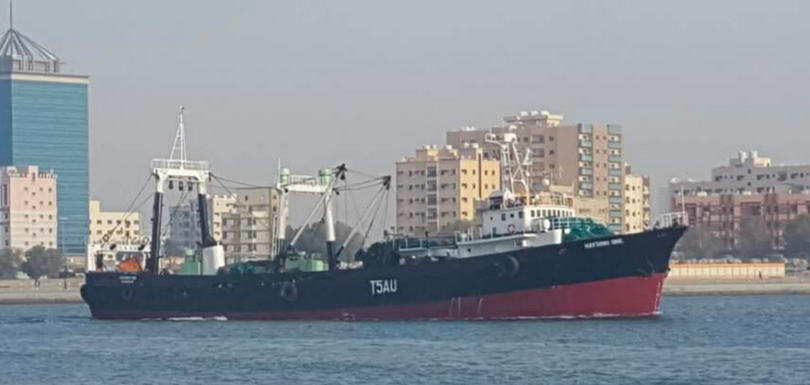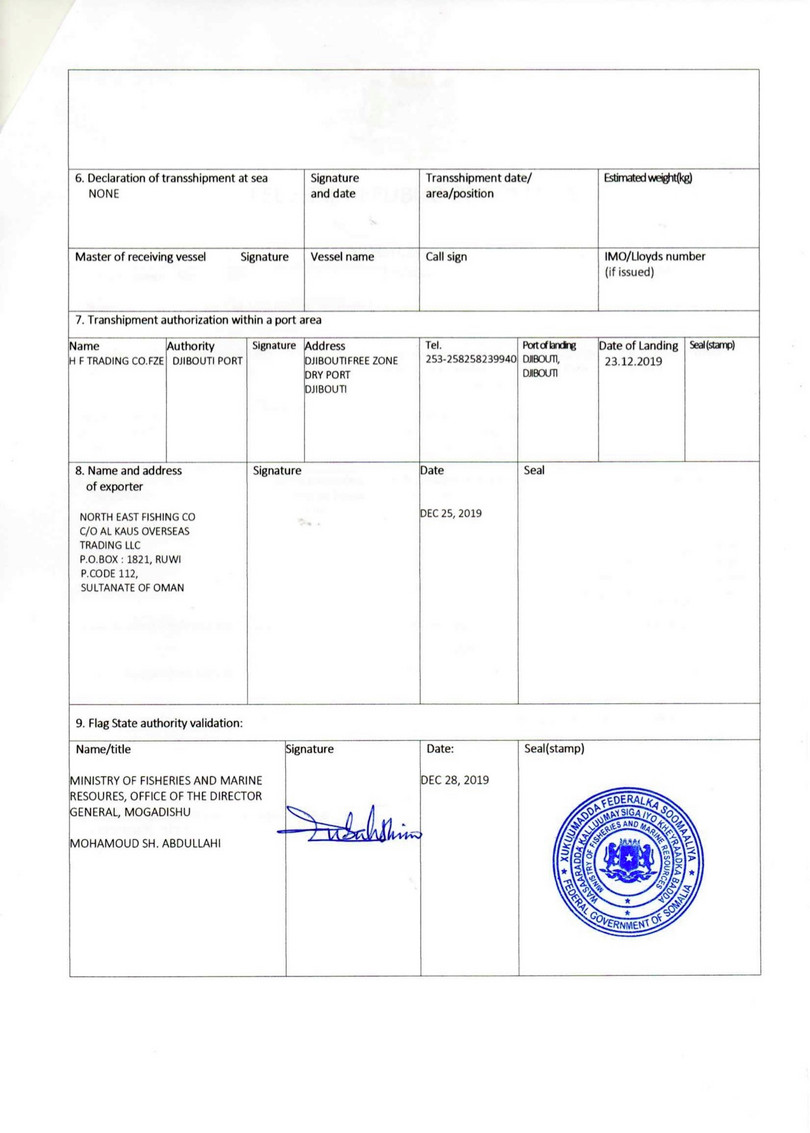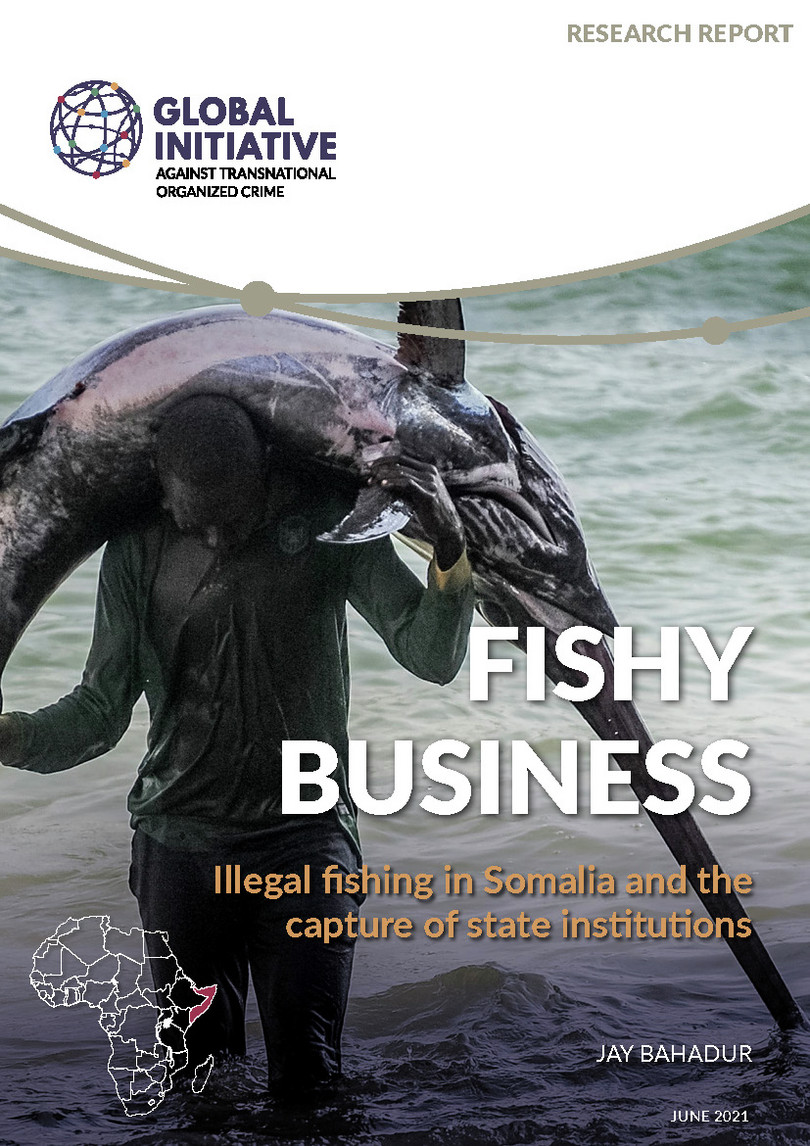Somalia proposes reforms to fishing licences – will they curb corruption related to illegal fishing?
Amid claims of corruption within government bodies managing fishing regulation, Somalia has announced its intention to propose a new law that will aim to streamline its fishing licensing regime and close loopholes that enable illegal fishing.1 The law, which was originally drafted in July 2020, still requires approval from the federal parliament (currently embroiled in election deadlock) before it takes effect.2
The announcement comes just weeks after a GI-TOC report in which we reported that vessels engaging in IUU fishing in Somali waters are often enabled by actors within government institutions. The problem has been worsened by the fact that, currently, regulation of fisheries in Somalia is a fractured picture: some decisions and authorizations issued by state bodies in one region are countermanded by other actors of the state or not recognized in other Somali regions. This creates a complex system that can be exploited by IUU fishing vessels operating along Somalia’s more than 3&nsbp;000 kilometre-long coastline.
Somalia’s Federal Ministry of Fisheries and Marine Resources claims the draft law will eliminate this uncertainty and bring together all Somali state agencies at federal government and regional level into a single streamlined licensing system. Mohamud Sheikh Abdullahi, the director general for Fisheries in the Ministry of Fisheries and Marine Resources, told the Daily Nation newspaper that the new law would address gaps in the licensing system and federal power-sharing system, as well as deal with corruption and environmental protection.3

The Haysimo One, one of the vessels owned by the North East Fishing Company. This particular vessel was reported to have caught fire and sunk off the coast of Djibouti on 4 August 2018.


A catch certificate for the vessel Haysimo Two, dated 28 December 2019, signed and stamped by the director general of Somalia’s Ministry of Fisheries and Marine Resources. This certificate is an example of the paperwork produced for the North East Fishing Company with Mohamud Hayir Ibrahim as an intermediary.
The role of Mohamud Hayir Ibrahim
One of the government officials named in our report is Mohamud Hayir Ibrahim, minister of finance in the Federal Government of Somalia (FGS). The activities of Ibrahim in his role as a federal government official are at the centre of our investigation into the North East Fishing Company (NEFCO), a Somali fishing concern based in Puntland that has long enjoyed preferential treatment from local government officials. While NEFCO may be based in Puntland, its vessels are almost certainly part-owned by a Korean national based in Oman. All four vessels owned by NEFCO are trawlers, even though trawling is illegal under Somali law.
Ibrahim is a cousin of NEFCO director and founder Isse Haji Farah, also known as ‘Captain Isse’. Ibrahim also has been directly employed by Isse’s business ventures, with his curriculum vitae indicating that he was an assistant manager for NEFCO from 2001 to 2002. Between 2007 and 2009 he also held the position of general manager of Makhir Coast General Trading Company, a Dubai-based foodstuffs importer owned by NEFCO’s parent company, Al Jubail Trading Company LLC.
In 2012, Ibrahim became a member of the federal parliament in Mogadishu, a position he still held at the time of writing; 4 he was appointed in 2017 to his current position of state minister of finance, the second-highest ranking financial official in Somalia. Most crucially to NEFCO’s business interests, Ibrahim allegedly maintains a close interpersonal relationship with the FGS Minister of Fisheries and Marine Resources, Abdullahi Bidhan Warsame. Both Ibrahim and Warsame originally hail from Puntland and share living accommodation in Mogadishu.5 A Somali businessman involved in the fisheries sector claims that Ibrahim protects Captain Isse’s and NEFCO’s interests at the federal level.6
In 2019, it appears that the company began to leverage the relationship between Ibrahim and Warsame to obtain necessary export documentation from the federal government. The GI-TOC has reviewed extensive leaked documentation dating to early 2020 that shows unsigned catch and health certificates being transmitted to Ibrahim on numerous occasions by NEFCO representatives, including Captain Isse.
The health certificates – which are in both English and Mandarin script – indicate the intended consignee to be Wehai Sepia Foods Co. Ltd, a Chinese importer based in Shandong. Ibrahim would subsequently transmit the unsigned documentation to officials within the FGS Ministry of Fisheries and Marine Resources, including Warsame himself. The certificates were then returned to Ibrahim with the requisite ministry stamps and signatures, with no indication that any physical inspection of cargoes or other regulatory oversight had taken place.7
In addition to issuing catch and health certificates for NEFCO, the FGS Ministry of Fisheries and Marine Resources also continued to endorse and legitimize the fishing licences issued by the Puntland administration to NEFCO trawlers, even though trawling is illegal under Somali law. For both the catch and health certificates and the federal endorsements of NEFCO’s Puntland fishing licences were signed and stamped by the director general of the Ministry of Fisheries and Marine Resources, Mohamoud Sheikh Abdullahi Abdirahman. In essence, it appears that the FGS Ministry has acted as a factory for manufacturing paperwork for private commercial interests.
The issuance of health and catch certificates to the NEFCO vessels is not the only recent instance of irregular practices by senior officials within the Ministry of Fisheries and Marine Resources. In the wake of a federal government crackdown on corruption in August 2020, four ministry officials were sentenced to imprisonment. Most prominently, the ministry’s head of finance and administration was sentenced to a 10-year prison term and ordered to repay US$137 907 that he had misappropriated.8
Horn Investment Agency
Ibrahim and federal fisheries officials have gone beyond their work as a paperwork manufacturer for NEFCO. In early 2020, they seemed to have formed a business partnership with the purpose of selling access to Somali fishing rights to foreign clients.
Leaked documentary evidence viewed by the GI-TOC suggests that in early 2020 ministers Ibrahim and Warsame, along with a senior fisheries ministry adviser, were involved in the creation of the Horn Investment Agency, a private entity created to be the exclusive broker of Somali fishing rights to foreign companies. Ahmed Osman Farah, a high-ranking NEFCO officer and the nephew of company founder Captain Isse, was appointed as Horn Investment’s ‘business development manager’.9
In mid-May 2020, Abdirahman Osman, a senior adviser to the FGS Minister of Fisheries and Marine Resources, disseminated a draft work plan for the Horn Investment Agency in advance of a planned joint video conference among the partners. The invitees to this conference consisted of the two federal ministers (Ibrahim and Warsame), Ahmed Osman Farah and a fourth individual. Examples of company benchmarks outlined in the draft work plan included ‘Formulation of a framework for fisheries development’ and ‘Finalizing and launching the Fisheries Master Plan’, to be achieved by August and November 2020, respectively.10
Even though the company was still in the incipient stage of formation, it nonetheless began to search for prospective business opportunities. The same day as the draft work plan was circulated, Ahmed Osman Farah initiated contact with China Fishery Group Limited, a Hong Kong-based company that has operated in western Africa since 2012.11 Farah represented Horn Investment as having exclusive rights to issue fishing permits for foreign fishing vessels on behalf of the FGS Ministry of Fisheries and Marine Resources. At the time of writing, the GI-TOC was unaware of any response to this email from China Fishery Group, or whether Farah’s outreach had achieved any favourable outcome for Horn Investment.
It seems clear that Horn Investment intended to use access to government channels afforded to it by the fact that at least three company partners were highly placed state officials. In mid-May 2020, Ahmed Osman Farah apprised Ibrahim of Horn Investment’s attempts to initiate a business relationship with another Chinese fishing concern, Pingtan Marine Enterprise Ltd. In a document seen by the GI-TOC, Farah advised Ibrahim that Horn Investment should contact Pingtan Marine through the Chinese Embassy in Mogadishu. He further suggested that the contact be facilitated through an official channel, using a letterhead from either the FGS ministries of foreign affairs, planning or fisheries. At the time of writing, the GI-TOC has been unable to establish whether Horn Investment had successfully established a business relationship with Pingtan Marine,12 or entered any successful business arrangements on behalf of the Somali federal government.
The Horn Investment Agency is not the only instance where fishing licences in Somalia have sought to be used as an apparent opportunity for rent-seeking. Investigations have also show that in the Puntland Ministry of Fisheries and Marine Resources, the sale of fishing licences provides a stream of revenue for a network of ministry officials and private agents.
Responses to the GI-TOC’s findings
Before publication, the GI-TOC presented the individuals and entities named in our investigation with detailed accounts of the relevant findings and provided ample opportunity to review and comment thereon. Through a lawyer, Mohamud Hayir Ibrahim requested that the GI-TOC cease all contact with him.13 Since the publication of our report, Ibrahim has accused GI-TOC report author Jay Bahadur of hacking his email and plotting to kill him, and requested the Kenyan courts to bar the GI-TOC from conducting any further investigations of his role in illegal fishing.14 He has not denied the claims made in the report.
The actions of Ibrahim and other government officials with whom he has collaborated is just one example among many we have identified of how IUU fishing conducted by companies based outside Somalia is seemingly facilitated by actors within Somali state institutions. While the announcement of a draft law aimed at streamlining the fragmented fishing licensing system is one step that the Ministry of Fisheries and Marine Resources can take, our investigation has highlighted how several officials within this same ministry have been implicated in procuring paperwork illegally for NEFCO, and that corruption has stymied attempts at monitoring and reducing IUU fishing.

This article is an extract from ‘Fishy Business: Illegal fishing in Somalia and the capture of state institutions’, a report for GI-TOC by Jay Bahadur, which investigates key case studies of IUU fishing in Somalia and how individuals in state institutions have facilitated and profited from illegal fishing. Available at: https://globalinitiative.net/analysis/illegal-fishing-somalia/.
Notes
-
Abdulkadir Khalif, New Somalia Law Seeks to Rescue Fisheries From Looters, Nation, 19 July 2021, https://nation.africa/kenya/news/africa/somalia-seeks-to-shield-its-fish-from-looters-3478072. ↩
-
The GI-TOC has seen a working draft of the proposed law. ↩
-
Abdulkadir Khalif, Somalia: New Somalia law seeks to rescue fisheries from looters, Daily Nation, 19 July 2021, https://allafrica.com/stories/202107191004.html. ↩
-
The constitutional term of the 10th Parliament of Somalia, of which Mohamud Hayir Ibrahim is a member, expired on 27 December 2020. However, scheduled parliamentary elections have been delayed indefinitely due to a political crisis in Somalia that was ongoing at the time of writing. ↩
-
Interview with a source with intimate knowledge of the Somali fisheries sector, 26 January 2021, by text message. ↩
-
Interview with a source with intimate knowledge of the Somali fisheries sector, 4 March 2021, by text message. ↩
-
The fact that the NEFCO-owned Butiyalo/Haysimo vessels trans-ship their catches at Djibouti port makes it highly unlikely that federal government officials had any opportunity to physically inspect or verify any of the vessels’ consignments. ↩
-
Somalia jails four more officials over corruption as crackdown intensifies, Garowe Online, 27 August 2020, https://www.garoweonline.com/en/news/somalia/somalia-jails-four-more-officials-over-corruption-as-crackdown-intensifies. ↩
-
Farah had previously worked as a technical adviser in the Puntland Ministry of Planning and International Cooperation, headed at the time by Captain Isse’s younger brother, Shire Haji Farah. ↩
-
Draft work plan for Horn Investment Agency, on file with the GI-TOC. ↩
-
China Fishery Group Limited, Positioned to meet growing demand, http://www.chinafisherygroup.com/index.html (accessed 7 February 2021). ↩
-
Pingtan Marine Enterprise Ltd. has previously been the subject of allegations of IUU fishing practices, as well as of human and wildlife trafficking, which the company has denied. On 7 December 2020, the US Department of State announced that it had the revoked the visas of Pingtan Marine officials over alleged involvement in IUU fishing and human trafficking. EAP Bureau, The U.S. revoked more than 15 visas for those complicit in #IUU fishing, Twitter post, 7 December 2020, https://twitter.com/USAsiaPacific/status/1336001789699690496. ↩
-
Email from a lawyer representing Mohamud Hayir Ibrahim, 29 March 2021. ↩
-
Brian Wasuna, Somalia Minister Mohmaud Ibrahim Sues Canadian Journalist Over ‘Plot’ to Kill Him, Nation, 2 August 2021, https://nation.africa/kenya/news/africa/somalia-minister-sues-canadian-journalist-over-plot-to-kill-him-3494692. ↩
